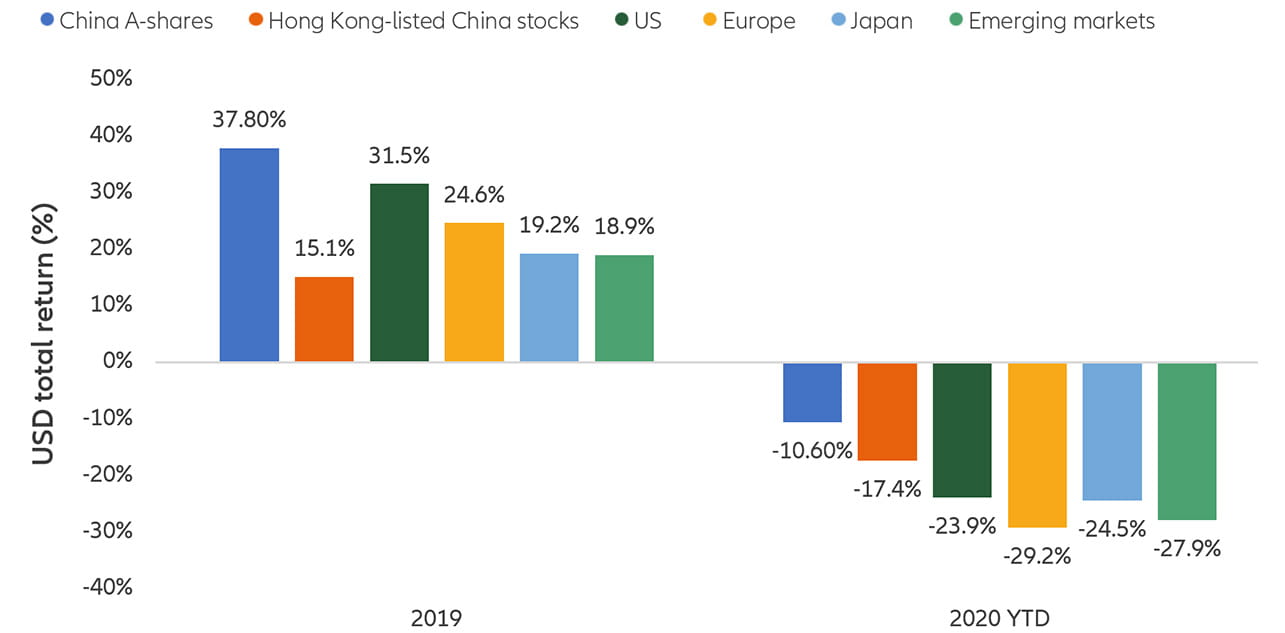
Summary
While the world battles the coronavirus pandemic, China has already made strides towards mitigating the virus’s effect on its people and economy. Although the country is not yet out of danger, we expect China’s economy to recover in the second half of this year – which could be another positive signal for China’s domestically driven A-share market.
Key takeaways
|
Amid so much uncertainty, don’t overlook China A-shares
As the coronavirus pandemic grows increasingly serious in many parts of the globe, the true human cost is only slowly becoming clear. The ultimate economic effect will be difficult to assess as well, though we have already seen a dramatic slowdown in the global economy and an end to a multi-year bull market.
Yet although China was hit hard by this viral outbreak only a few months ago, we expect China’s economy to recover in the second half of this year. As a result, while most investors are understandably cautious about taking risk amid so much uncertainty, we believe now is a good time to take a closer look at China A-shares – Chinese companies that are listed in domestic markets in Shanghai and Shenzhen, and made available to local and foreign investors.
After a coronavirus slowdown, corporate China appears set to rebound
China’s economy was already set to slow in 2020, but strict quarantine measures early in the year brought economic activity to a temporary halt even as they saved countless lives. Assuming the country doesn’t get hit with a massive second wave of infection, we think domestic economic activity could continue to strengthen in the coming months.
This should help expectations for corporate earnings growth, which moved lower earlier this year. Since then, most of China’s large companies and around two thirds of its small- to medium-size companies have resumed work, according to China’s Ministry of Industry and Information Technology. We expect this will help ease stress in the global supply chain and help Chinese manufacturers, even though the sharp contraction in overseas demand is still expected to slow orders for Chinese exports.
China’s success at executing its post-coronavirus recovery plan is one of the main reasons why China A-shares have been resilient compared to risk assets globally. As the accompanying chart shows, China A-shares have fallen this year, but significantly less so than other asset classes.
China A-shares have been outperforming other major equity markets
Gross return (USD) as at 24 March 2020

Source: Refinitiv Datastream, Allianz Global Investors. Data as at 24 March 2020. Returns are calculated on USD total return basis. Indices used are: MSCI China A Onshore Index, Hang Seng Chinese Enterprises Index, S&P 500 Composite Index, MSCI Europe Index, TOPIX Index, MSCI Emerging Market Index. Past performance, or any prediction, projection or forecast, is not indicative of future performance.
The future of A-shares depends on global consumers and domestic investors
In our view there are two key – and opposing – influences that will determine the near-term direction of China A-shares:
- Globally, consumers could spend less on Chinese goods. The key risk is the global demand shock if consumers spend less due to the fall-off in economic activity. Although 90% of A-share company revenues are domestic, according to investment group CLSA, China will still feel secondary consequences of the global economy’s sudden downturn. This will limit the rate of China’s economic recovery.
- Chinese investors could keep buying domestic stocks. On the other hand, liquidity conditions in China remain favourable for equities, in contrast to the rest of the world. The main participants in China A-share markets are onshore private investors. Their investment options are generally limited to domestic equities, the domestic bond market, where yields are falling, or the property market, where prices are already high. So far, this scenario has been winning, which has helped A-share performance.
We are also optimistic about China’s outlook because of its monetary policy. The People’s Bank of China (PBoC) has a wider positive interest-rate gap than its counterparts in Europe, Japan and the United States. The PBoC also has a wider buffer between where its policy rate currently stands and the zero lower bound – or even negative territory. These factors bode well for attracting capital inflows and providing stronger support to economic growth.
The long-term case for A-shares remains unchanged
The structural trends supporting A-shares are still in place. For example, the onshore A-share market is large and diversified, with bigger exposure to so-called new economy industries like consumer services, electric vehicles and industrial automation. In addition, global indices continue to raise their A-share weightings even though it is not just foreign investors who are buying A-shares: domestic investors, employees and company management teams have all increased their ownership in the past two years.
Perhaps most importantly, the correlations between China A-shares and other major asset classes is still very low. According to Bloomberg data from 31 January 2020, the correlation of A-shares and world equities was around 0.2 over the past 10 years, while the correlation with US and European equities was even lower. Including China A-shares in a global portfolio helps diversify away some portfolio risk and could help generate a much better risk-return profile.
In addition, the relatively underdeveloped nature of China’s capital markets may well be playing to its advantage in the current environment. The forced liquidations seen elsewhere, for example from risk-parity strategies or leveraged quant-driven hedge funds, are not a big influence in China’s primarily retail-driven domestic markets.
Considerations for investors
- China’s success at fighting the new coronavirus could impart a valuable lesson for investors in other regions. China has shown that the more important indicator of a country’s health – both physical and economic – is its ability to contain and combat the virus within its borders, rather than how much monetary and/or fiscal stimulus it plans to enact.
- We expect domestically focused Chinese companies to feel less of an impact from a global slowdown caused by the coronavirus pandemic. China’s recovery is likely to be supported by companies that focus on domestic demand, and by public infrastructure investment projects. But use caution when considering Chinese companies that rely more on external trade, such as auto component makers.
- There is a considerable amount of debt in China, and smaller businesses experiencing business disruption may have difficulty accessing funding at this stage. But this is also positive news for the stronger players. Look for small- to mid-cap companies that are market leaders in niche market segments, like semiconductors or frozen foods. These are fragmented industries, and gaining market share here while competitors are challenged could lay the groundwork for multiple years of high growth.
1127875

Summary
When fears of the new coronavirus seized hold of markets in early March, already low government-bond yields fell to record levels amid a historic “flight to quality”. Given the impending global recession, government bonds will likely continue to be attractive for now – although their yields will be low and liquidity concerns will make them volatile. But over the long term, we favour spread products such as investment-grade and high-yield corporate bonds.
Key takeaways
|
-
Investing involves risk. The value of an investment and the income from it will fluctuate and investors may not get back the principal invested. Past performance is not indicative of future performance. This is a marketing communication. It is for informational purposes only. This document does not constitute investment advice or a recommendation to buy, sell or hold any security and shall not be deemed an offer to sell or a solicitation of an offer to buy any security. The views and opinions expressed herein, which are subject to change without notice, are those of the issuer or its affiliated companies at the time of publication. Certain data used are derived from various sources believed to be reliable, but the accuracy or completeness of the data is not guaranteed and no liability is assumed for any direct or consequential losses arising from their use. The duplication, publication, extraction or transmission of the contents, irrespective of the form, is not permitted.
This material has not been reviewed by any regulatory authorities. In mainland China, it is for Qualified Domestic Institutional Investors scheme pursuant to applicable rules and regulations and is for information purpose only. This document does not constitute a public offer by virtue of Act Number 26.831 of the Argentine Republic and General Resolution No. 622/2013 of the NSC. This communication's sole purpose is to inform and does not under any circumstance constitute promotion or publicity of Allianz Global Investors products and/or services in Colombia or to Colombian residents pursuant to part 4 of Decree 2555 of 2010. This communication does not in any way aim to directly or indirectly initiate the purchase of a product or the provision of a service offered by Allianz Global Investors. Via reception of his document, each resident in Colombia acknowledges and accepts to have contacted Allianz Global Investors via their own initiative and that the communication under no circumstances does not arise from any promotional or marketing activities carried out by Allianz Global Investors. Colombian residents accept that accessing any type of social network page of Allianz Global Investors is done under their own responsibility and initiative and are aware that they may access specific information on the products and services of Allianz Global Investors. This communication is strictly private and confidential and may not be reproduced. This communication does not constitute a public offer of securities in Colombia pursuant to the public offer regulation set forth in Decree 2555 of 2010. This communication and the information provided herein should not be considered a solicitation or an offer by Allianz Global Investors or its affiliates to provide any financial products in Brazil, Panama, Peru, and Uruguay. In Australia, this material is presented by Allianz Global Investors Asia Pacific Limited (“AllianzGI AP”) and is intended for the use of investment consultants and other institutional/professional investors only, and is not directed to the public or individual retail investors. AllianzGI AP is not licensed to provide financial services to retail clients in Australia. AllianzGI AP is exempt from the requirement to hold an Australian Foreign Financial Service License under the Corporations Act 2001 (Cth) pursuant to ASIC Class Order (CO 03/1103) with respect to the provision of financial services to wholesale clients only. AllianzGI AP is licensed and regulated by Hong Kong Securities and Futures Commission under Hong Kong laws, which differ from Australian laws.
This document is being distributed by the following Allianz Global Investors companies: Allianz Global Investors GmbH, an investment company in Germany, authorized by the German Bundesanstalt für Finanzdienstleistungsaufsicht (BaFin); Allianz Global Investors (Schweiz) AG; in HK, by Allianz Global Investors Asia Pacific Ltd., licensed by the Hong Kong Securities and Futures Commission; in Singapore, by Allianz Global Investors Singapore Ltd., regulated by the Monetary Authority of Singapore [Company Registration No. 199907169Z]; in Japan, by Allianz Global Investors Japan Co., Ltd., registered in Japan as a Financial Instruments Business Operator [Registered No. The Director of Kanto Local Finance Bureau (Financial Instruments Business Operator), No. 424], Member of Japan Investment Advisers Association, the Investment Trust Association, Japan and Type II Financial Instruments Firms Association; in Taiwan, by Allianz Global Investors Taiwan Ltd., licensed by Financial Supervisory Commission in Taiwan; and in Indonesia, by PT. Allianz Global Investors Asset Management Indonesia licensed by Indonesia Financial Services Authority (OJK).







